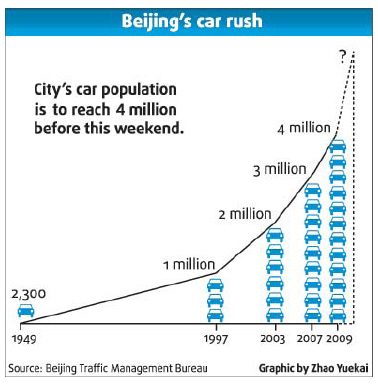 Beijing this week passed a big milestone, adding the 4 millionth car to the roads. As this graph shows, the rate of additions have skyrocketed. I’ve collected some good press releases, as well as more scholarly data for air quality junkies to delve into.
Beijing this week passed a big milestone, adding the 4 millionth car to the roads. As this graph shows, the rate of additions have skyrocketed. I’ve collected some good press releases, as well as more scholarly data for air quality junkies to delve into.
This “milestone” of the 4 millionth car, in the midst of the Copenhagen conference, has led to a lot of official newspaper reports discussing the increased effects on air quality. China Daily has a nice editorial remarking on how the official air pollution index needs to be updated. Another China Daily column discusses comments by Peking University professors regarding worsening air quality. Yet another China Daily article discusses Beijing’s plans to confront the issue.
Scholarly Research
One excellent collection of research is from the Boston-based Health Effects Institute. One of their most relevant papers discusses health effects of outdoor air pollution in Asia. Another is a recent analysis of the largest air pollution and health effects study being done worldwide, a million-person cohort study already monitoring people for over 20 years, run by the American Cancer Society.
Other excellent groups in Asia:
- UrbanEmissions – an outstanding group of articles as well as a blog with links to scholarly research, and a collection of working papers from their SIM-air project, including PDFs on Ten FAQ About Particulate Matter and Estimating Health Impacts of Air Pollution
- Livefrombeijing – an excellent blog focusing on the environment
- The Clean Air Initiative – covering all Asian cities
- The Asia Society – reporting on Beijing air
Other Links
Here’s the daily official API from each of Beijing’s pollution monitors (from Beijing Municipal Environmental Protection Bureau)
Also, the national Ministry of Environmental Protection has a snazzy new datacenter which can pump out user-friendly graphs, forecasts and city comparisons. You can access, in English, an air quality forecast as well as AQI data from the previous day. There’s a good review of this website’s new features from livefrombeijing.com.
More on Indoor Air
Will Chickering, the chief Emergency Medicine doctor at United Family Hospital and also a public health doctor, had a nice post last week on the Yahoo group Beijingcafe which nicely reviews some issues with indoor air:
A couple of years ago, new to Beijing, I wondered what harm might occur to me and my family after 4-5 years’ exposure to atrocious air. I scoured the scientific literature, then wrote an article for Urbane. Unfortunately, neither Urbane nor its website still exists, so I have just uploaded the article to BJ Café (“Air Pollution and Expats”).
Basically, I learned that the worst component of air pollution from the point of health effects is traffic-related, i.e., within 150-200m of four-lane streets/highways (which can be easily identified on a Google Map of Beijing), and that the worst of the worst are fine and ultra-fine particles, which seep indoors with such efficiency that their concentration is almost the same indoors as out. HEPA air purifiers can help, but only in closed rooms where the machines need to be set at a rate to clean a room’s volume TWICE in one hour (to keep ahead of the seepage). Unless the rooms are very small, this rate is very loud.
Following these probable facts to their logical conclusion, the best thing you can do for your children is send them to schools as far as possible from big roads (including the schools’ playing fields). Failing that, the next best thing is to reduce your children’s school-related dose of ultra-fine particles by making sure that their diesel school buses are retrofitted to reduce ultra-fine emissions (check out the US EPA site at www.epa.gov/cleanschoolbus/retrofit.htm), as well as by banning idling vehicles outside schools. And air-purifiers? Every little bit helps. But don’t let your school (or health-club or office) think that they can get by with a few token machines. Find out about the school’s Heating-Ventilation-AirConditioning (HVAC) system: are the filters at least MERV 13 rated? Make sure the school improves the seals on doors and windows. Note that, unless your school does these things, being indoors is not much different than being outdoors, and restricting outdoor play helps, but only because kids breathe faster and deeper when they are outside running around!
It is counter-intuitive, but even on crepuscular days with an AQI of 500, not much benefit is gained from being indoors unless significant effort has been made to stay ahead of the seepage indoors of nearby vehicle emissions.
The same thing applies to health clubs and offices. Ask that windows stay closed/sealed, even in summer. Air conditioning helps, by the way. Not a lot, but it helps. In recalcitrant health-clubs, you can agitate for the creation of one closed exercise room into which they can move their 2-3 air-purifiers currently dispersed on prominent-if-useless display. (Figure out any room’s cubic volume in meters (paces). Just eyeball the vertical. The purifier’s dial needs to be set at twice that volume in cubic meters per hour.)
Follow me on Facebook: @BainbridgeBabaDoc
Photography: www.richardsaintcyr.com
The lengths we must go through to ensure clean air in Beijing. This is frightening…I'll send this on to some local friends though for a review.